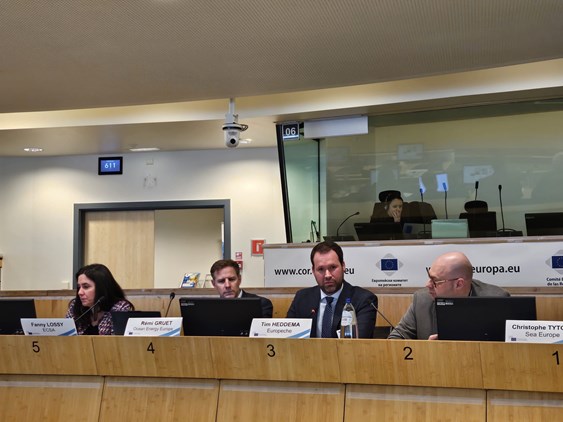Europêche highlights fisheries as cornerstone of the European Oceans Pact

In a public hearing organized by the European Economic and Social Committee (EESC), Tim Heddema, Vice-President of Europêche, emphasized the importance of keeping fisheries at the heart of the EU's vision for the oceans. The sector’s representative highlighted fisheries’ vital contributions to EU food sovereignty, healthy diets, coastal community livelihoods and marine ecosystem stewardship, urging the EU to prioritize and strengthen these roles in the EU Oceans Pact. This political initiative launched by President von der Leyen, is set to be presented at the 3rd UN Ocean Conference in June 2025.
The European Oceans Pact aims to foster a holistic and integrated approach to ocean-related policies. This includes maintaining a healthy, resilient, and productive ocean, promoting a sustainable and competitive blue economy — including fisheries — and advancing a comprehensive agenda for marine knowledge, research, innovation and investment.
In this context, the fishing sector is not only a critical provider of low-carbon and nutritious seafood but also a sector committed to sustainability and innovation. The EU fleet has already reduced emissions by 52% and continues to lead the way in adopting cleaner technologies, such as energy-efficient engines and advanced fishing gears.
Mr Heddema stated: “EU fisheries are a low-carbon, renewable source of protein, yet Europe imports 70% of its seafood. The Oceans Pact must close this production gap, prioritize EU food production and self-sufficiency, while ensuring that imported seafood meets the same high sustainability standards as EU products.”
Heddema called attention to the challenges faced by coastal and fishing communities, compounded by shocks like COVID-19, Brexit, rising energy costs and increasing regulatory burdens. Such pressures threaten generational renewal and the socio-economic viability of the fleet. He urged the European Oceans Pact to prioritize adaptation policies, streamline bureaucracy, promote social cohesion, and enhance the image of the sector as a modern, attractive and sustainable career.
Maritime spatial planning emerged as another crucial element in Europêche’s vision for the Pact. The sector advocated for balanced and inclusive planning to allow a positive coexistence of fisheries with other maritime sectors. Fishers and coastal communities must have a seat at the decision-making table to ensure traditional fishing grounds are protected and that industrial developments, such as offshore wind farms, are implemented without causing undue socio-economic or ecological harm.

Heddema called for a stronger focus on ocean health, emphasizing the need for the European Oceans Pact to be grounded in science-based management. He highlighted the fisheries sector as a key contributor to marine data collection, underscoring the importance of strengthening scientific organizations to advance ecosystem-based approaches.
Initiatives such as fishing-for-litter schemes were praised for demonstrating the vital role fishers play in maintaining clean oceans and supporting the circular economy. Heddema also stressed the urgency of international cooperation to tackle marine pollution and advocated for a comprehensive global plastics treaty to address this pressing issue.
Finally, Europêche called for stronger governance and ocean diplomacy to ensure a level playing field for the European fishing industry. Heddema urged the EU to secure sustainable fishing agreements with third countries, lead global efforts to eliminate harmful fisheries subsidies, and intensify the fight against illegal, unreported, and unregulated (IUU) fishing. He also emphasized the need to enhance maritime security, protecting critical infrastructure and trade routes from emerging threats.
The sector called for adequate financial support to realize these ambitious goals. The current European Maritime, Fisheries, and Aquaculture Fund (EMFAF) is insufficient to drive the necessary investments in innovation, decarbonization and competitiveness. The recent budget cut of €105 million for 2025–2027, he argued, undermines the EU's commitment to a sustainable future for its oceans and coastal communities.
Heddema concluded: “As the EU shapes its Oceans Pact, it must prioritize this vital sector — one that has sustainably harnessed our seas for centuries, supports coastal communities, and provides healthy, nutritious food to citizens across Europe.”
The public hearing will inform the EESC exploratory opinion on Civil Society's Vision for a European Oceans Pact[1].
END
Press Contact: Daniel Voces de Onaíndi, Managing Director of Europêche
Email: daniel.voces@europeche.org Phone: +32 489 26 81 07
[1] https://www.eesc.europa.eu/en/our-work/opinions-information-reports/opinions/civil-societys-vision-european-oceans-pact
Sources: Europeche
Attachments:
Tags: Oceans Pact, Blue economy